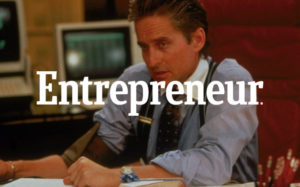Originally Published on Entrepreneur.com

Money is a funny thing in Hollywood movies. Popular films are designed to make lots of money, not to explain prudent financial ideals to viewers. Some good ones, like The Big Short, offer a pretty accurate glimpse into financial realities. Others stick to pure fantasy. (Despite the big-money stakes, I don’t think anyone learned any sound financial planning strategies from Now You See Me 2, which was in theaters this summer and came out on DVD this month).
But even in the silliest Hollywood caper, some sound financial lessons can still sneak through — though they’re not always obvious.
When finance is your life, great stories about money are especially fascinating. It’s important to remember, of course, that movies are entertainment, not financial advice. Gordon Gekko isn’t a real person, and the SEC has been the least of Charlie Sheen’s legal concerns. But, you could do a lot worse than follow a tip or two embedded in some of the best, most re-watchable financial movies of all time:
1. ‘Wall Street’: Greed isn’t always good.
Let’s start with one of my favorites. In Oliver Stone’s Wall Street, Michael Douglas plays Gordon Gekko as the ultimate corporate raider, becoming a classic Reagan-era anti-hero in the process. In the film’s story, Gekko’s unmitigated greed catches up to him, but the real lesson is the one learned by Charlie Sheen’s character, Bud Fox. Fox spends money he doesn’t have on the big apartment, expensive dinners and fancy art to emulate Gekko. Yet his entry-level stockbroker job can’t sustain that kind of spending spree. Fox resorts to using insider trading to pay his bills, even betraying his own father in the process. And, for what? A nicer suit?
Lesson: A little greed can keep us motivated to succeed — everyone likes the perks that come with a fat wallet. But making the acquisition of money the sole reason to wake up in the morning is an act of self-sabotage.
2. ‘The Money Pit’: Don’t make acquisitions based on emotion.
Tom Hanks’ and Shelley Long’s characters in The Money Pit think they’ve found the house of their dreams: They fall in love with the seller and rush into a purchase without doing their due diligence. Needless to say, it costs them — in hilarious fashion. Before long, the extensive repairs the house needs swallow all their assets whole. It’s a funny story, but sadly one that’s too true for many home-buyers.
Lesson: Always do your research and budget calculations before jumping into any big purchase. It saves a lot of regret.
3. ‘Glengarry Glen Ross’: High-pressure tactics damage both salespeople and customers.
Alec Baldwin’s “Always Be Closing” speech never fails to get the blood pumping through any salesperson worth his or her salt, but Glengarry Glen Ross is ultimately the tale of high-pressure sales tactics wrecking lives on both sides of the transaction. The pressure to succeed against all odds turns the film’s sales staff into desperate men: lying, participating in infighting, even stealing to keep their jobs.
Lesson: No job is worth compromising your dignity and integrity for “success.” By the time the movie’s characters have learned this lesson the hard way, it’s too late to recover.
4. ‘The Wolf of Wall Street’: Instant gratification is no long-term solution.
Leonardo DiCaprio’s character in The Wolf of Wall Street, Jordan Belfort, is a master at selling junk stocks to clients for big commission checks. He “earns” millions by appealing to people’s greed, enriching himself and leaving his clients busted. In real life, Belfort was eventually brought down by his lies and illegal tactics, but there is a new Jordan Belfort born every minute, hoping to make you into a sucker.
Lesson: When making an investment, you can’t listen only to the things you want to hear. Challenge the people trying to sell you. Seek out advice from experts, not salespeople. If an opportunity sounds too good to be true, trust your instincts.
5. ‘The Social Network’: Safeguard your bankable ideas.
Every entrepreneur dreams of hitting upon a billion-dollar idea before anyone else. Few of us do, of course, and when we do, it’s crucial to take the necessary steps to protect that idea. That was the message many of us walked away with from The Social Network, a great movie about the rise of Facebook. The Winklevoss Twins had an incredible idea for a social networking site before such a thing even had a name. They brought Mark Zuckerberg in to help, but they never gave him a formal employment contract or specified any terms regarding intellectual property ownership or noncompetition.
Lesson: Zuckerberg ran away with their idea and made a mint, while the Winklevosses scrambled to sue for a fraction of Facebook’s value. Had they been older and more experienced, perhaps they’d have known how to protect their intellectual property.
6. ‘The Big Short’: When you’re right, stick to your guns.
If The Big Short taught us anything, it’s that when you’re right, you have to have a little faith and stay the course. All of the protagonists in the movie, from Steve Carrell’s jaded banker to Christian Bale’s eccentric fund manager, were told over and over again that they were wrong — that the U.S. housing market couldn’t crash. No one believed them, but they evaluated the evidence and stuck to their guns because they could see what no one else wanted to. They were vindicated in the end — some of the few who didn’t take a huge hit in the financial crash of 2008.
Lesson: To avoid ruin as they did, first, make sure you’re right. Then refuse to be convinced otherwise.